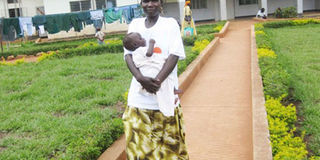Two die in labour as blood crisis hits Lira Hospital

One of the lucky women who have successfully given birth from Lira Hospital. PHOTO BY HUDSON APUNYO
Only days after a distraught couple sued the Jinja Regional Referral Hospital over neglect that they allege caused the death of their new born baby, two women who went into labour pains and a baby died at Lira Regional Referral Hospital in similar circumstances.
Acen Middy reported at the hospital on May 27, was operated on and her baby saved, but she did not live to see the infant. Another expectant mother, Eunice Acola, 30, reported on May 25, and both mother and child died three days later.
There is outcry in Lira about neglect at the hospital.
But hospital authorities deny any wrongdoing.
The Director, Dr Jane Aceng Ocero, was at first not aware of the deaths when this reporter visited her office on Tuesday but promised to cross check and pass on the information.
“We are very concerned when a mother dies. We even convene a meeting to establish the cause,” Dr Aceng said.
She later confirmed there were two deaths and not three, as earlier reported. She said the first woman, whose child was saved, came to the hospital on May 27 in second stage of labour which started from home and she was bleeding.
“She arrived at 10:10pm and it was discovered that she was in second stage of labour, anaemic and the placenta was obscuring the baby’s exit,” Dr Aceng said.
She said the woman was immediately taken to the surgical theatre and operated upon to save the child. She said the mother needed blood but there was no blood at the hospital.
The second mother came on May 25 with fever and was diagnosed with malaria in pregnancy.
Dr Aceng said she was severely anaemic but improved a bit and requested to go back home. The woman returned three days later, and was found to be severely anaemic and in shock after losing blood. The foetus was already dead, according to Dr Aceng.
Last week in Jinja, a couple sought court intervention when they suspected that their new born baby had died out of neglect by hospital staff.
Although the hospital administration denied any wrongdoing, there is consensus that most health centres in the country lack even the most basic equipment and drugs.
According to a 2009 Unicef report, Uganda is still one of the countries with the highest child mortality rates in the world with more than 130 deaths in every 1,000 births while maternal mortality is at 550 deaths per 100,000 live births, also very high compared to global standards.
In both deaths, the mothers needed emergency blood transfusion but there was no blood at the hospital. Dr Aceng said since May 22, there has not been blood at the medical facility.
“We have only received 25 units of blood today and this will last only two days,” she said. “We did not have blood to give the mothers, it was not neglect as was being reported.”
“I have always complained about blood. The blood supplied from Gulu is not enough. Now that Gulu is not working, we are in a crisis.”
She said Gulu lacks kits to screen blood.
The officer in-Charge Gulu Regional Blood Bank, Dr Sam Uringtho, said the blood issue is a national problem. He said for the last one month, the National Blood Bank in Kampala has not supplied the necessary reagents for screening blood.
“We have the blood but no reagents for screening,” Dr Uringtho said on phone. He said they have the blood but have to send samples to Kampala for screening a process that takes sometime since all other regional blood banks in the country are affected. “We are all lining up for one machine in Kampala,” he said.
Dr. Uringtho said the headquarters have not given explanation as to why the reagent is not supplied as requested.
The Director Uganda Blood Transfusion Service, Dr Dorothy Kyeyune Byabazaire, was reportedly out of the office. The secretary who answered the phone could not give details.




